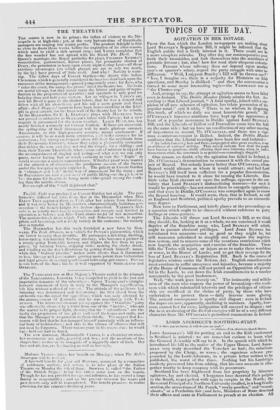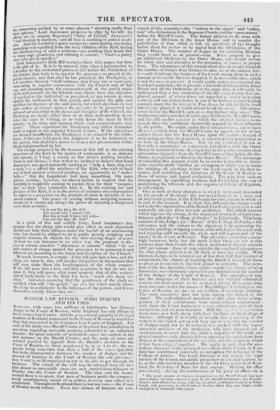LORD A BERDEEN'S SOOTHING-SYRUP. " If it docs you no
harm, it will do you no good." —Address gran American Quack Doctor, 1.0E A DER OLEN'S bill for putting an end to the Kirk excitement in Scotland is printed : we are somewhat curious to learn what the General IN hsenibly will say to it. In the speech with which he introduced his bill to the notice of the Upper house, Lord ABER.. DE EN very truly described the Veto-law at bad ; the substitute proposed by time Clergy, as worse ; the sagacious scheme propounded by the Lord-Advocate, in it private letter written tohe published, the worst of the three. Nothing but bis Lordships modesty prevented hint front adding, that his own measure is altogether worthy to keep company with its precursors. Scotland has been frightened from her propriety by itinertud agitators, lay and clerical. Clergymen have deserted their pulpits in the South, to get pelted with eggs in sawpits in the 'North; the Reverend Prilicipal ()fa Northern University rivalled, in a long Gaelic oration, the attractions of Mr. Punch, " rowly-powliee," and"roundabouts," at a Perthehire fair ; and here, Ministers of State deserted their offices and seats in Parliament to preach at an election. All the commotion excited by so many planets " shooting madly from their spheres," Lord ABERDEEN proposes to allay by his bill : its effects are to surpass SOLOMON'S "balm of Gilead,' ATKINSON'S 66 real blessing to mother's," and all that is soothing in patent medicine. And his Lordship s grave compeers—anticipating wry-looks, scratching and squalling front the testy children of the Kirk, during the administering of such a nostrum—are nodding their heads like so mane sage grandams, and whining in concert, " That's a pretty dear, tile goody-goodies." Lord Anstionua's Kirk Bill occupies three folio pages, but here is the pith of it. It is to be enacted, that xvlien a presentation to a benefice by the undoubted patron is laid before the Presbytery of the district, that body is to appoint the presentee to preach in the parish-church ; and that after he has preached, the Presbytery, or a Committee thereof; "shall intimate, that if any one or more persons, being in regular communion with the Church and of full age, and standing upon the communion-roll of the parish made up in such manner as the Church may direct, have any objection of any hind to the individual so presented, or any reason to state against his settlement in that parish, and against his gifts and qualities for the Cure Of the said palish, but which objections do NOT Ole, matter elf cl,arge against the presentee to be prosecuted and Meowed out according to the forms and discipline of the Church, the Presbgtery are ready, either then or at their next meeting, to receive the saute in writing, or to write down the same in their minutes, in the form and manner which such communicants may desire." These objections the Presbytery may either determine itself or report to the superior Church Courts. If the objections are deemed insufficient, the Presbytery is to proceed to the settlemeat; if they are held good, the judgment is to be intimated to the patron, who shall have power to issue a new presentation within the period prescribed by law.
The change proposed by the framers of this bill in the existing procedure of the Kirk in the matter of settlements, is so delicate and minute, (" I hear a sound, so fine there's nothing breathes 'twixt it and silence,") that at first we inclined to believe that Lord ABERDEEN was good-naturedly seeking to " help a lame dog over
style,"—i. e. afford the ministers of the Kirk, who wish to back out of their present awkward position, an opportunity to " makebelieve" that the Legislature had done something. On more narrow scrutiny, however, we almost incline to suspect that his Lordship is waggishly seeking to punish them for their " rampaugin," as their own vernacular hath it. By the existing law and practice of the Kirk, it is in the power of members of a congregation to object to a presentee on the grounds of error in doctrine or immoral conduct. The power of vetoing without assigning reasons, means Of it means any thing) the power of rejecting a clergyman upon these gown's :
"I do not like thee, Dr. Fell. The reason 'why I cannot tell;
But this at least I know full well—
I do not like thee, Dr. Fell."
In a spirit of fine and subtile irony, Lord ABERDEEN may propose that the clergy who would give effect to such objections should not hide their silliness under the bushel of an unreasoning veto,. but should be obliged to sit in public gravely weighing such exquisite reasons, fit objects for the slow-moving finger of scorn. At least we can interpret in no other way the proposal to discuss in solemn conclave " objections or reasons' which " do not inter matter of charge against the presentee to be prosecuted and followed out according to the forms and discipline of the Church."
So much, however, is certain : if the bill pass into a law, and the clergy act upon it, they will involve themselves in discussions that will soon make them the laughingstock of the whole country. If the bill pass into a law, and they acquiesce in but do not act Upon it. they will prove, what many suspect, that all this ecclesi
astical hurly-burly in the Kirk has been '6 much ado about nothings" And even assuming that the gentlemen of the cloth arc satisfied, what will " the people" say of a law which merely: allows the clergy to participate in the influence ot the patron, and leaves themselves exactly where they are ?



























 Previous page
Previous page